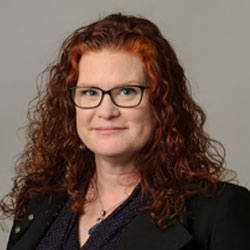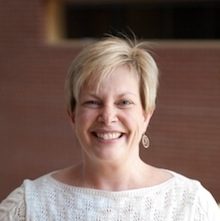National Fellowships Incentive Awards
The Office of National Scholarships and Fellowships (ONSF) has recognized professors Stacey Hanlon, Eric May and Carol Teschke (Fall '21) and Kat Milligan-McClellan (Spring '22) for their work mentoring students through the process of developing proposals and submitting applications for eligible awards. The National Fellowships Incentive Program (NFIP) works to build a stronger student and faculty culture around applying for prestigious, nationally competitive scholarships and fellowships. They each received $1000 in professional development funds.
Rachel O’Neill, professor in the Department of Molecular and Cell Biology and Department of Genetics and Genome Sciences is one of three UConn scholars honored this year with its most prestigious faculty title, the Board of Trustees Distinguished Professor
O’Neill’s work centers on how genomes function and evolve.  She uses cutting-edge genomic, computational and imaging approaches to gain fundamental insights into chromosome biology and genome evolution in a wide variety of organisms. Her studies on the structure and function of chromosome centromeres, essential for proper chromosome segregation during cell division, have shaped the field of centromere biology. She is highly sought-after as a collaborator on large-scale national and international projects that require a high-level expertise in genome assembly curation.
She uses cutting-edge genomic, computational and imaging approaches to gain fundamental insights into chromosome biology and genome evolution in a wide variety of organisms. Her studies on the structure and function of chromosome centromeres, essential for proper chromosome segregation during cell division, have shaped the field of centromere biology. She is highly sought-after as a collaborator on large-scale national and international projects that require a high-level expertise in genome assembly curation.
O’Neill’s work on repetitive DNA, which makes up about 50% of the human genome but is frequently dismissed as “junk DNA”, has had far-reaching impact, including on normal fetal and placental development, the discovery of novel retroelements, evolutionary breakpoints and chromosome evolution, and continuing challenges to the centromere paradox. She is part of the team that released the first complete human genome sequence, published in a series of papers in Science. Her 2010 publication titled “Chromosomes, Conflict, and Epigenetics: Chromosomal Speciation Revisited”, remains one of the most cited reviews from the Annual Review of Genomics and Human Genetics. Collectively, O’Neill has published more than 100 peer-reviewed articles and led or contributed to projects that have brought over $23 million in extramural funding to UConn.
O’Neill is also the director of the Institute for Systems Genomics (ISG). As Director of the ISG, she has developed multiple new degree programs, initiated core facilities and programs (including the SARS-COV2 Surveillance Program) and established the iGEM and Genome Ambassadors outreach programs. Most recently, O’Neill organized and hosted Nobel Laureate Dr. Jennifer Doudna for the ISG Distinguished Lecture series, an event that attracted about 1,800 attendees for the live virtual presentation.
O’Neill also is part of the team that spearheaded the COVID-19 testing efforts at UConn that have helped UConn remain safe, efforts that were widely praised throughout the country including by White House Coronavirus Response Coordinator (2020-2021), Dr. Deborah Birx.
O’Neill has been recognized with several honors for her teaching, research and service, including a UConn Excellence in Teaching award, a Connecticut Women of Innovation – Academic Leadership Award, and is an elected member of the Connecticut Academy of Science and Engineering.
MCB Celebrates Promotion of Four Faculty
Congratulations to
Leighton Core, promotion to Associate Professor
Thomas Abbott, promotion to Associate Professor In-Residence
David Daggett, promotion to Associate Professor In-Residence
Patricia Rossi, promotion to Associate Professor In-Residence
Evaluations for promotion, tenure, and reappointment apply the highest standards of professional achievement in scholarship, teaching, and service for each faculty member evaluated.
MCB Professor Teschke Elected to Connecticut Academy of Science and Engineering

The Department would like to congratulate Dr. Carol Teschke for her recent election to the Connecticut Academy of Science and Engineering (CASE)
The Connecticut Academy of Science and Engineeringwas established in 1976 by Special Act of the Connecticut General Assembly to fulfill a need for authoritative and organized technical advice for state government. CASE is a non-profit institution patterned after the National Academy of Sciences.
CASE members are elected based on recognition of their scientific and engineering distinction achieved through significant contributions in theory or applications, as demonstrated by original published books and papers, patents, the pioneering of new and developing fields, and innovative products, outstanding leadership of nationally recognized technical teams, public service, and external professional awards in recognition of scientific and engineering excellence.
David Knecht Awarded 2022 Edward C. Marth Mentorship Award

The Marth Award was established by the UConn AAUP to recognize the leadership and dedication of Edward Marth, former Executive Director of the UConn AAUP Chapter, and to encourage and reward outstanding mentoring of graduate students by UConn Graduate Faculty members. It is awarded annually to a faculty member with an extraordinary record of excellence and effectiveness in graduate student mentoring. Dr. Knecht has demonstrated such a record, and the MCB department is happy that he has been recognized for his exceptional contributions to graduate student mentoring through this award. The Marth Award winner is invited to give a short address at the PhD graduation ceremony in May.
Graf Receives 2022 CLAS Faculty Mentoring Award
 Joerg Graf has been awarded the CLAS 2022 Faculty Mentoring of Graduate Students Award. The Faculty Mentoring Awards recognize faculty who demonstrate exemplary support, encouragement, and the creation of opportunities to enrich the learning and professional development of others. Awards are given in three categories each year: mentoring of faculty, mentoring of graduate students, and mentoring of undergraduate students.
Joerg Graf has been awarded the CLAS 2022 Faculty Mentoring of Graduate Students Award. The Faculty Mentoring Awards recognize faculty who demonstrate exemplary support, encouragement, and the creation of opportunities to enrich the learning and professional development of others. Awards are given in three categories each year: mentoring of faculty, mentoring of graduate students, and mentoring of undergraduate students.
Holster Scholar Mentors
Professors Ken Campellone and Jonathan Klassen agree to mentor Holster Scholars Ryan Frier and Darren Lee respectively. Each will receive $1000 in the form of professional development funds that are available from a generous donation from Robert (’68) and Carlotta (’68) Holster, UConn alumni dedicated to the success of ambitious and curious students.